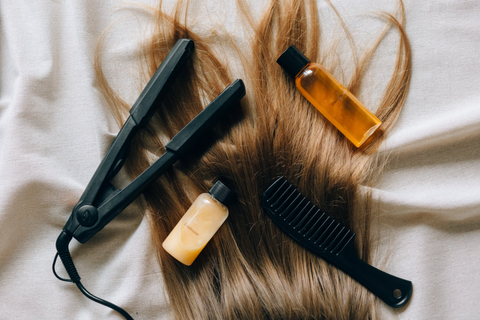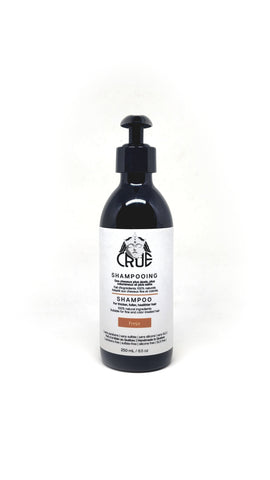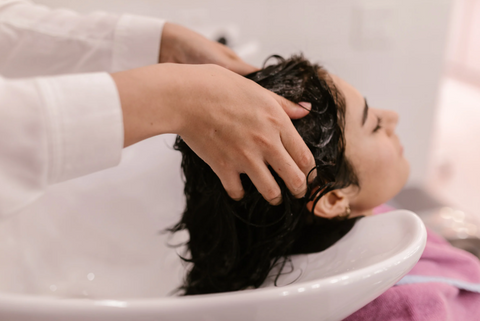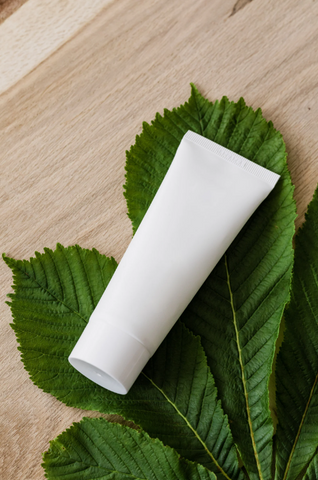How often do you wash your hair? The answers to that question will vary from person to person, but most women are very specific about how often they wash their hair.
But when it comes to their shampoo, responses become much less specific. Have you considered whether or not your shampoo is designed to help you to achieve your hair goals?
As we all know, there's an infinite variety of shampoos on the market, so many that it's hard to know where to start.
Your shampoo is the foundation of any good hair routine. That's why it's so important to choose the one that fits your needs.
In this article, we tell you all about the different types of shampoo available and when to use them:
- Medicated shampoos
- Aesthetic shampoos
- Herbal and organic shampoos
- Dry shampoos
- Co-washing
Medicated shampoos
This type of shampoo is formulated with medicated ingredients. They're effective in treating scalp problems such as seborrheic dermatitis or psoriasis.
Some medicated shampoos require a prescription from your doctor.
The therapeutic ingredients in these shampoos will affect the appearance of color-treated hair.
Their great use is the treatment of scalp problems. However, they tend to remove much of the hair's natural protective oils. It's a bit like replacing one problem with another.
If possible, avoid these shampoos except when it’s really necessary. We recommend exploring non-medicated solutions before attempting this option. For more advice on the natural treatment of dandruff, see this article: "How to treat your dandruff".
Aesthetic shampoos

Aesthetic shampoos are composed of milder surfactants that have little or no stripping effect on natural hair oils.
These are gentle shampoos used to treat split ends and damaged cuticles and increase hair elasticity.
If you find any of the following terms confusing, read this article that demystifies important hair vocabulary you should be familiar with.
Many beauty shampoos contain conditioning and moisturizing ingredients to make hair more manageable. These shampoos are so gentle, they have very little cleansing action.
This is a good option for you if you wash your hair several times a week.
However, if you use heavy-duty styling products and gels, these shampoos may be too gentle to properly clean your hair.
We recommend using a detoxifying shampoo once a month to remove any product build-up and unclog your scalp.
Plant-based and organic shampoos
Plant-based shampoos contain only castile soap instead of the detergents and surfactants common in ordinary shampoos.
These natural shampoos are formulated by blending a variety of plant infusions with natural soaps. Many natural ingredients can be added to organic shampoos to improve hair color, stimulate hair growth, reduce thinning, and combat dandruff and other scalp issues.
These solutions offer an excellent alternative to commercial shampoos that use synthetic reproductions of natural extracts.
Your hair and body tend to react better to the real substance than to the synthetic version.
Organic and herbal products don't mask the problem as many commercial products do.
On the contrary, they improve the hair and scalp's ability to heal.
Bear in mind that with natural products, results are not instantaneous. Be patient. With time and a little bit of commitment, you'll start noticing improvements in your hair.
Two natural shampoos we particularly love are Freÿa and Zephïr.

Freÿa is a gentle cleanser suitable for all hair types. It’s formulated with Maca root, rosemary, and basil extract specifically to repair and stimulate hair growth.
Zephïr is our new favorite. This natural shampoo removes impurities and restores balance to your scalp. It's a great alternative to medicinal shampoos.
Its antibacterial formula helps treat scalp problems such as dryness and flakes. It contains ingredients renowned for their antioxidant and antibacterial properties, such as apple cider vinegar, neem, and cedarwood.
Register now to gain access to the Zephïr private sale when it begins on June 19.
Dry shampoos
A popular way to cleanse the scalp on the go and without water is to use a dry shampoo.
Dry shampoo is a powder generally made from corn or rice starch.
Its main purpose is to remove excess sebum from the scalp. Many of these products contain botanical ingredients that cleanse the scalp while invigorating and nourishing it.
Dry shampoos won't completely replace traditional shampoos, but they will help you keep your scalp clean between washes and allow you to wash your hair less frequently.
Some people often hesitate to use dry shampoos for fear of not applying them correctly.
Here's how to use dry shampoo:
- Part your hair where you wish to apply the shampoo.
- Hold the shampoo container a few centimeters from the area to be treated.
- Spray your roots in a regular motion.
- You can hold your head upside down while you apply the product.
- Leave the product on for 5 to 10 minutes.
- Massage your scalp with your fingertips as you would a damp shampoo in the shower.
- Gently smooth your hair with a brush or comb.
- Finish by lightly running your fingers through it one last time.
- Avoid handling your hair for the rest of the day.
Co-wash (Conditioner)
The last category on this list of shampoo is actually a conditioner.
Co-washing is a technique that has become very popular in recent years.
It involves washing your hair with a conditioner without first applying shampoo.
It's a perfect solution for women who regularly have dry, brittle hair.
This can be the case for those who wash their hair more than once a week. Co-washing adds moisture, revitalizes and preserves your hair's natural sebum, but doesn't actually cleanse it.
If you choose co-washing as your preferred "shampoo", you need to clarify your hair more often to avoid product residue build-up.
Here's how to do your co-wash right:
- Rinse your hair with warm water for about 3 minutes.
- Massage your scalp with your fingers to loosen residues.
- Add conditioner and wash as you would shampoo.
- Leave the conditioner in the hair for 5 minutes.
- Rinse your hair.
- Continue with the rest of your usual hair routine.
An excellent product for co-washing is the Zéphïr Detox Conditioner, a gentle yet effective detoxifying treatment that will combat dry scalp and improve hair growth.

Conclusion
Not all shampoos are created equal. The different options available have no more secrets for you. Now it's your turn to experiment and find the type of shampoo that suits you best.
Medicated shampoos are specially designed to treat scalp disorders such as psoriasis.
They often require a doctor's prescription, so prioritize a natural alternative above all else. Natural and organic shampoos offer a wide range of options. You will definitely find the one that suits your needs.
For those in a hurry and in need of an express hair refreshment, dry shampoos will do the trick.
For dry, brittle hair, co-washing is an interesting option to consider.
Last but not least, aesthetic shampoos are gentle and fit in well with your routine if you wash your hair several times a week.
We hope this article inspires you to find the right shampoo. We'd love to hear from you. Share with us in the comments your favorite type of shampoo. And of course, don't hesitate to ask us your questions!
At Crüe Cosmetics, your beauty is in the hands of nature.

